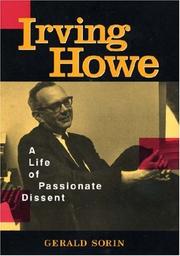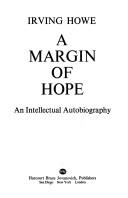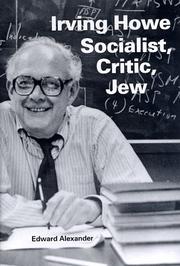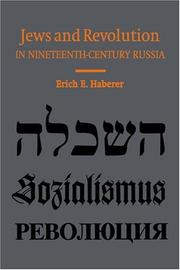| Listing 1 - 10 of 18 | << page >> |
Sort by
|
Book
ISBN: 2234056144 9782234056145 Year: 2003 Publisher: Paris : Stock,
Abstract | Keywords | Export | Availability | Bookmark
 Loading...
Loading...Choose an application
- Reference Manager
- EndNote
- RefWorks (Direct export to RefWorks)
Jews --- Jewish radicals --- Journalists --- Lazare, Bernard, --- Dreyfus, Alfred, --- Trials, litigation, etc.
Book
Year: 1997 Publisher: Princeton, N.J. Princeton University Press
Abstract | Keywords | Export | Availability | Bookmark
 Loading...
Loading...Choose an application
- Reference Manager
- EndNote
- RefWorks (Direct export to RefWorks)

ISBN: 0814798217 0814708846 0814740200 0814740774 1417588373 8147407742 Year: 2002 Publisher: NYU Press
Abstract | Keywords | Export | Availability | Bookmark
 Loading...
Loading...Choose an application
- Reference Manager
- EndNote
- RefWorks (Direct export to RefWorks)
Jewish critics --- Jewish radicals --- Jews --- Intellectual life --- Howe, Irving. --- New York (N.Y.) --- Intellectual life.
Book
ISBN: 0253346185 Year: 1985 Publisher: Bloomington (Ind.) : Indiana university press,
Abstract | Keywords | Export | Availability | Bookmark
 Loading...
Loading...Choose an application
- Reference Manager
- EndNote
- RefWorks (Direct export to RefWorks)
Jewish radicals --- Jews --- Politics and government --- United States --- Emigration and immigration. --- Ethnic relations.
Book
ISBN: 9782849502174 Year: 2009 Publisher: Paris : Éditions Syllepse,
Abstract | Keywords | Export | Availability | Bookmark
 Loading...
Loading...Choose an application
- Reference Manager
- EndNote
- RefWorks (Direct export to RefWorks)
Jewish radicals --- Holocaust, Jewish (1939-1945) --- Jews --- Holocauste, 1939-1945 --- Juifs --- History. --- Histoire --- Soviet Union --- URSS --- Ethnic relations. --- Relations interethniques

ISBN: 0151571384 Year: 1982 Publisher: San Diego [etc.] Harcourt Brace Jovanovich
Abstract | Keywords | Export | Availability | Bookmark
 Loading...
Loading...Choose an application
- Reference Manager
- EndNote
- RefWorks (Direct export to RefWorks)
American literature --- Howe, Irving --- Jewish critics --- Jewish radicals --- Jews --- Intellectual life. --- Howe, Irving. --- New York (N.Y.) --- New York (State) --- Intellectual life --- Biography --- Critics

ISBN: 0253333644 Year: 1998 Publisher: Bloomington Indianapolis Indiana University Press
Abstract | Keywords | Export | Availability | Bookmark
 Loading...
Loading...Choose an application
- Reference Manager
- EndNote
- RefWorks (Direct export to RefWorks)
For over fifty years, from the 1940s to the 1990s, Irving Howe was a commanding, if controversial, figure in American intellectual life. Writing with the productivity of a major industry, Howe took on issues ranging from left-wing politics and American writers to Yiddish literature, the State of Israel, the condition of the American academy, and New York cultural and literary life. Best known for his prize-winning history of American Jewish immigrant culture, World of Our Fathers, Howe was an outspoken socialist as well as founder and editor of the democratic socialist magazine Dissent. Through a clear, eloquent, and forcefully argued study of Howe's politics, writings, and thought, Edward Alexander constructs a sympathetic yet critical intellectual biography of this complex individual.
Howe, Irving --- New York (N.Y.) --- Intellectual life --- Biography --- Jews --- New York (State) --- Critics --- Jewish radicals --- Jewish critics --- Howe, Irving. --- Intellectual life.

ISBN: 0521460093 0521528496 0511628684 Year: 1995 Publisher: Cambridge ; New York ; Melbourne Cambridge University Press
Abstract | Keywords | Export | Availability | Bookmark
 Loading...
Loading...Choose an application
- Reference Manager
- EndNote
- RefWorks (Direct export to RefWorks)
Jews and Revolution in Nineteenth-Century Russia is a carefully researched study of 100 years of Russian-Jewish revolutionary history, exploring the origins and characteristics of Jewish participation in Russian revolutionary politics between 1790 and 1890. Focusing sharply on Jewish motivations and the qualities of Russian Jewish activists, it drastically reverses the traditional historiographical trend of de-Judaising and minimising the role of Jews who joined Russian revolutionary circles, especially during the movement's Populist phase of the 1870s and 1880s. By the same token, it challenges many clichés and assumptions which have governed conventional wisdom on the radical behaviour of so-called assimilationist 'non-Jewish Jews'. This revisionist approach restores a neglected yet important group of Jews to their rightful place in the historical experience of the Jewish people in Russia.
Jews --- Jewish radicals --- Radicalism --- History --- Russia --- Ethnic relations. --- 19th century --- Ethnic relations --- Jews - Russia - History - 19th century. --- Jewish radicals - Russia - History - 19th century. --- Radicalism - Russia - History - 19th century. --- Russia - Ethnic relations. --- Arts and Humanities --- Extremism, Political --- Ideological extremism --- Political extremism --- Political science --- Radicals
Book
Abstract | Keywords | Export | Availability | Bookmark
 Loading...
Loading...Choose an application
- Reference Manager
- EndNote
- RefWorks (Direct export to RefWorks)
Social change --- History of Europe --- Jewish religion --- anno 1900-1999 --- anno 1800-1899 --- Jewish radicals --- Holocaust, Jewish (1939-1945) --- Jews --- Holocauste, 1939-1945 --- Juifs --- History --- Histoire --- Soviet Union --- URSS --- Ethnic relations --- Relations interethniques
Book
ISBN: 1644694654 1644694662 1644694638 1644694646 9781644694664 9781644694657 9781644694633 9781644694640 Year: 2020 Publisher: Brookline, MA
Abstract | Keywords | Export | Availability | Bookmark
 Loading...
Loading...Choose an application
- Reference Manager
- EndNote
- RefWorks (Direct export to RefWorks)
Jack Nusan Porter’s writings date back to 1966 during the height of the Vietnam War. He describes the anguished struggle against war, racism, and poverty, as well as the radical groups involved—Jewish socialists, radical Zionists, radical Jews, Rabbi Meir Kahane and the Jewish Defense League, hippies, liberals, and conservatives alike. In addition, the anti-Zionist, anti-Israel, anti-Semitic and revolutionary terrorism of the times are all vividly described. Here, Porter draws from the past in order to explain the present, walking the precarious bridge between allegiance to Israel and the Jewish people and the universal rights of all people. This collection of old and new essays combines theory, sociology, film studies, literary criticism, post-modern thought, and politics to understand our present situation.
Jewish radicals. --- Jews --- Radicalism --- Radicals --- 1960s. --- Holocaust. --- Israel. --- Jewish radical. --- New Left. --- Yiddish culture. --- Zionism. --- activism. --- antisemitism. --- fascism. --- genocide. --- hippies. --- liberation. --- neo-Nazism. --- politics. --- progressivism. --- racism. --- reform. --- social change. --- socialism. --- sociology.
| Listing 1 - 10 of 18 | << page >> |
Sort by
|

 Search
Search Feedback
Feedback About UniCat
About UniCat  Help
Help News
News